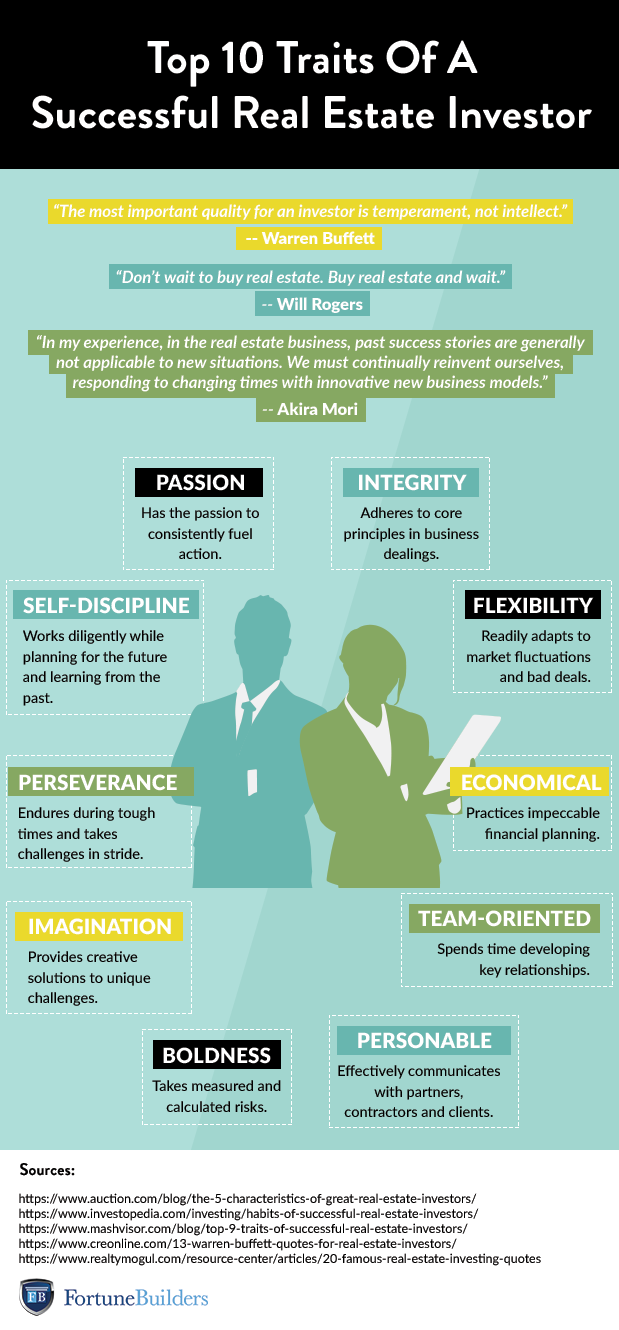Expert-Verified Answer. The Answer is Realizing a quick profit. (Option-c). Investing in real estate can offer multiple benefits, but realizing a quick profit is not one of them.
What are the guidelines for investing?
The golden rules of investing
- If you can't afford to invest yet, don't. It's true that starting to invest early can give your investments more time to grow over the long term.
- Set your investment expectations.
- Understand your investment.
- Diversify.
- Take a long-term view.
- Keep on top of your investments.
Which of the following are disadvantages of real estate investing quizlet?
Some of the disadvantages of real estate as an investment include: (a) large amounts of capital required, making it difficult for the small investor to purchase income-producing property; (b) the considerable financial risk involved in many types of real estate investment; (c) the relative illiquidity of real estate;
What are the three basic investment considerations?
Any investment can be characterized by three factors: safety, income, and capital growth. Every investor has to pick an appropriate mix of these three factors. One will be preeminent. The appropriate mix for you will change over time as your life circumstances and needs change.
What is one of the main disadvantages of investing in real estate?
Real estate investments tend to have high transactional costs, especially in legal and brokerage fees. The process of acquiring a new property is also very long and tedious with lots of legal formalities. Another disadvantage of property investments is that they are not easy to liquidate.
How can I teach myself real estate?
5 Best Ways to Learn Real Estate Investing in 2023
- Refer to the Best Books. Well-written books change your thinking pattern, empowering you to look at things with a unique perspective.
- Universities' Extension Courses.
- Seminars & Events.
- Online Sources.
- To Summarize:





1: Get organized
— Brian Feroldi (🧠,📈) (@BrianFeroldi) January 1, 2023
You can’t make good decisions without good information.
Start by tracking your:
▪️Income (monthly & yearly)
▪️Expenses
▪️Net Worth
Use @mint or a spreadsheet (I have a FREE template below you can download) pic.twitter.com/RH1Ozh3qvZ
What are the basics of real estate?
Real estate encompasses the land, plus any permanent man-made additions, such as houses and other buildings. Any additions or changes to the land that affects the property's value are called an improvement.
Frequently Asked Questions
Can real estate be self taught?
There are various courses out there like Udemy and BiggerPockets that provide real estate investing courses to teach people about the basics of real estate. Online courses are a great way for beginners to understand and become more familiar with what real estate investing really is.
What age is best to buy an investment property?
Financial Stability Knows No Age
Regardless of age, the key factors to evaluate are your current financial situation, income streams, and ability to handle financial commitments. Age itself does not determine your financial capabilities or eligibility for investment opportunities.
Is 30 too late to start investing in real estate?
It's Never Too Late To Grow
The age that you enter the wealth-building game is certainly important. Time and compounding are your friends. So, of course you'd prefer to start investing in your 20s and never face big financial setbacks for your entire life.
How do I decide to invest in real estate?
What to Look For
- Expected cash flow from rental income (inflation favors landlords for rental income)
- Expected increase in intrinsic value due to long-term price appreciation.
- Benefits of depreciation (and available tax benefits)
- Cost-benefit analysis of renovation before sale to get a better price.
How do real estate stocks work?
Most REITs have a straightforward business model: The REIT leases space and collects rents on the properties, then distributes that income as dividends to shareholders. Mortgage REITs don't own real estate, but finance real estate, instead.
Can I invest $1000 in a REIT?
Real Estate Investment Trusts (REITs)
Real estate investment trusts (REITs) are one of the best ways to invest 1,000 dollars, and are beginner-friendly. An REIT pools investor funds together to purchase real estate properties.
What is the 1 rule in real estate investing?
For a potential investment to pass the 1% rule, its monthly rent must be equal to or no less than 1% of the purchase price. If you want to buy an investment property, the 1% rule can be a helpful tool for finding the right property to achieve your investment goals.
What is the 2% rule for rental investments?
The 2% rule is the same as the 1% rule – it just uses a different number. The 2% rule states that the monthly rent for an investment property should be equal to or no less than 2% of the purchase price. Here's an example of the 2% rule for a home with the purchase price of $150,000: $150,000 x 0.02 = $3,000.
What is the 1% rule in rental investment?
Multiply the purchase price of the property plus any necessary repairs by 1% to determine a base level of monthly rent. Ideally, an investor should seek a mortgage loan with monthly payments of less than the 1% figure.
How do I avoid 20% down payment on investment property?
Yes, it is possible to purchase an investment property without paying a 20% down payment. By exploring alternative financing options such as seller financing or utilizing lines of credit or home equity through cash-out refinancing or HELOCs, you can reduce or eliminate the need for a large upfront payment.
FAQ
- How profitable is rental real estate?
- The amount will depend on your specific situation, but a good rule of thumb is to aim for at least 10% profit after all expenses and taxes. While 10% is a good target, you may be able to make more depending on the property and the rental market.
- What is the 50% rule in rental property?
- The 50% rule or 50 rule in real estate says that half of the gross income generated by a rental property should be allocated to operating expenses when determining profitability. The rule is designed to help investors avoid the mistake of underestimating expenses and overestimating profits.
- How do you get money out of real estate investment?
- The most common way to make money in real estate is through appreciation. Appreciation is when a property grows in value. You might purchase a property for $400,000, and over the course of 10 years, it appreciates to a value of $500,000. Sell the property, and you'll have profited $100,000.
- How to avoid capital gains tax when selling investment property?
- A few options to legally avoid paying capital gains tax on investment property include buying your property with a retirement account, converting the property from an investment property to a primary residence, utilizing tax harvesting, and using Section 1031 of the IRS code for deferring taxes.
- What is the 5 rule in real estate investing?
- That said, the easiest way to put the 5% rule in practice is multiplying the value of a property by 5%, then dividing by 12. Then, you get a breakeven point for what you'd pay each month, helping you decide whether it's better to buy or rent.
- What is the 2 rule in real estate investing?
- 2% Rule. The 2% rule is the same as the 1% rule – it just uses a different number. The 2% rule states that the monthly rent for an investment property should be equal to or no less than 2% of the purchase price. Here's an example of the 2% rule for a home with the purchase price of $150,000: $150,000 x 0.02 = $3,000.
- How do I get out of a bad house investment?
- Sometimes the best way to end a bad real estate deal is to simply talk to the seller and request permission to exit. Although it's not the ideal way to end a contract, this last ditch effort can provoke even the hardest of sellers to accept your cancellation.
- Is real estate investor a good career?
- Real estate investing can be lucrative, but you must have a plan. Successful real estate investors understand three critical aspects of the business: They understand what the market needs.
- How do I market myself as a real estate investor?
- 4 Marketing Strategies For Real Estate Investors
- Find Off-Market Properties.
- Target Motivated Sellers.
- Utilize Direct Mail.
- Leveraging Social Media.
Which of the following is not a guideline for investing in real estate?
| What is the difference between a real estate investor and a broker? | Real estate agents earn commissions on their deals. This can vary from 1% to 5%, or sometimes even more, depending on the property. However, a real estate investor earns no commission; rather, the investor benefits from the difference between the purchase price and sale price of a property. |
| How does an investor get paid from real estate? | Real estate often proves to be a lucrative investment, offering both income — in the form of rents and appreciation — when you sell appreciated property at a profit. It's also a good way to diversify your portfolio, as an asset that's subject to different influences than stocks and bonds. |
| Is real estate investor hard? | Surveys show that most Americans think real estate is a great long-term investment. So, what holds people back? Let's be honest: It can be hard to get into real estate investing because it's a big commitment. You'll have to put in a lot of time, money and serious work! |
| Who are the key parties to a real estate investment transaction? | Interested parties to a transaction include, but are not limited to, the property seller, the builder/developer, the real estate agent or broker, or an affiliate who may benefit from the sale of the property and/or the sale of the property at the highest price possible. |
| What are the three most important factors in real estate investments? | The Most Important Factors for Real Estate Investing
|
| What are the four stages of a real estate transaction? | The Anatomy of a Real Estate Transaction Pre-contract period: This includes all negotiations prior to signing a contract. Due diligence period: This is the time for inspections. Financing period: Final financial arrangements are made. Closing preparation period: All documentation is provided to all parties. |
| What is an example of a real estate transaction? | In this article, “real estate transaction” refers to any action related to the purchase or sale of a property / real estate. This includes, for example, preparing the sale of a property, making and receiving offers, valuing and inspecting the property, and drawing up and signing the sales agreement. |
| Who are the parties to an investment agreement? | The parties to an investment agreement are the company and the investor. A shareholders agreement is between the company and all its shareholders, including the investor(s), if they are to become a shareholder as a result of the investment. |
| Can you own property internationally? | The Bottom Line: There Are Ways To Make Your International Property Dream Come True. Overall, buying international property comes with a range of potential rewards but just as many risks. Your experience will vary based on the country you're interested in, though. Some may be easier to navigate than others. |
- What is the best country to start real estate?
- The Best Place to Invest in Property in the World: Top 8 Picks
Location Selling Point Population Singapore A promising market in Asia 5,984,244 Berlin Europe's new investment hotspot 3,574,000 Tokyo Immense benefits from the 2020 Olympics 37,194,000 Dubai A tax-free haven for property investors 3,570,000
- The Best Place to Invest in Property in the World: Top 8 Picks
- Can I invest in real estate in other countries?
- Purchasing real estate overseas, as a vacation home or an investment property, is achievable and can help diversify a broader asset portfolio. Mortgages are not always available for foreign borrowers, so cash or funds from investment accounts may be your best option.
- How to invest in global real estate?
- Mutual funds and exchange-traded funds offer the easiest and most efficient way for investors to add global listed real estate allocations to portfolios. While the U.S. remains the largest listed real estate market, the listed real estate market is increasingly becoming global.
- Do I pay US taxes on foreign property?
- Do US Citizens Have to Pay Taxes on Foreign Property? All US citizens must file a yearly tax return regardless of where they live in the world. When filing your return, you must report your worldwide income. This includes any gain or loss from selling a foreign property and rental income.
- How does a beginner invest in real estate?
- Buying your own home is a great way to invest in real estate with relatively little money because you can often purchase with as little as 0-3% down. Plus, when you're ready to move or upsize later on, you can either sell your house — typically for a profit — or keep it and rent it out, earning yourself passive income.
- What is the 1% rule in real estate investing?
- The 1% rule of real estate investing measures the price of the investment property against the gross income it will generate. For a potential investment to pass the 1% rule, its monthly rent must be equal to or no less than 1% of the purchase price.
- How to start investing in real estate with little money?
- 5 Ways to Begin Investing In Real Estate with Little or No Money
- Buy a home as a primary residence.
- Buy a duplex, and live in one unit while you rent out the other one.
- Create a Home Equity Line of Credit (HELOC) on your primary residence or another investment property.
- Ask the seller to pay your closing costs.
- 5 Ways to Begin Investing In Real Estate with Little or No Money
- What type of property is best for first time investor?
- The best investment property for beginners is generally a single-family dwelling or a condominium.
- What type of real estate is best for beginners?
- REIT Investing Real estate investment trusts (REITs) are a good jumping off point for those new to real estate. Equity REITs, which are the most common type, are essentially companies that own income-generating real estate.